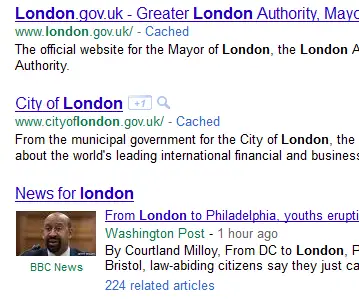Universal Search is actually something Google unveiled way back in May 2007, and it’s become so ingrained in their user experience that you’re actually most likely using it every day without even realizing it.
It simply refers to Google’s practice of including a mix of results from their different search engines, including images, videos, maps and news, for a given search query. See the example below of news headlines blended alongside traditional web search results:

For different types of queries, you might also see images, Youtube videos, local results and maps, and even shopping results.
At the time, this was a big deal for Google. Beforehand, there was no way to blend results from their different properties together, and instead you’d only see an alert box telling you that you might want to try your search over on Google Books, for example.
Google’s Benefits From Universal Search
With search engine results featuring a combination of regular web links, videos, images, and maps, it’s natural to wonder what types of content are showing up the most. Does Google accurately predict when we want images to be integrated into our search, and when we’d like to see shopping results or local maps?
Also, since many other companies also produce these types of media, is Google showcasing the wide range of results available online, or are they unfairly favoring their own properties?
The SEO firm Searchmetrics recently completed a large-scale study about Universal Search, with some interesting findings.
First, videos and images have seen an explosion in prominence since late 2010, showing up in around 60% and 30% of searches respectively. Other types of search results are less frequent and have stayed relatively constant, except for Google Books results which have decreased significantly over the past year.
From a webmaster perspective, this data suggests that creating more videos and uploading properly optimized images are a good way to show up for more searches and increase website visitors.
Next, Searchmetrics analyzed the Top 10 websites that for each type of result. For images, it is blogspot.com while Youtube dominates the video results. (Both of these websites are owned by Google.) For shopping, number one is Google Product Search, while local searches are lead by, you guessed it, Google Maps. Competitors, ranging from other online retailers to local review sites such as Yelp and CitySearch, are often pushed down to the very bottom of the rankings.
Those who accuse Google of unfairly pushing their own stuff in their search results appear to have some evidence, and the complaints have become very serious, as Google is facing antitrust investigations in both the United States and Europe over their search results practices.
Google says that their practices are all part of their mission to deliver the best answer for the user as quickly as possible, but it will be interesting to see what the FTC, as well as authorities from other countries, conclude.


Leave a Reply